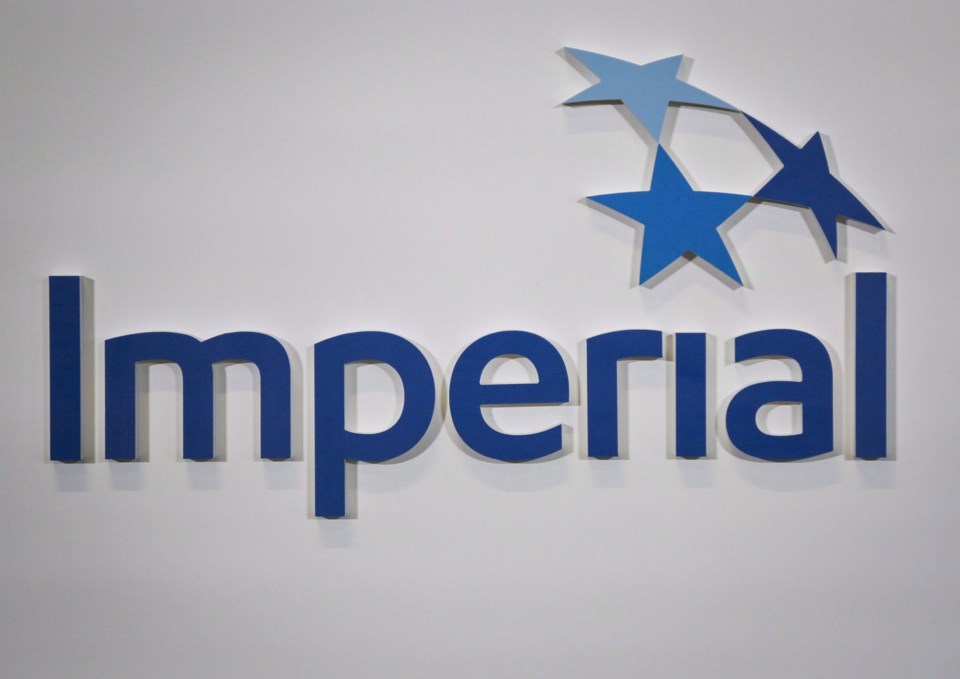CALGARY — Imperial Oil has been fined $50,000 after the province's energy regulator concluded the company broke environmental laws when wastewater containing oilsands tailings seeped outside its lease boundary in 2022.
The fine is accompanied by requirements for mitigation plans and research into the environmental effects of such wastewater and represents only the first part of the regulator's inquiry.
"These findings and resulting compliance and enforcement decisions do not encompass all potential contraventions that may have occurred at Kearl," the regulator said in a statement. "The investigation remains ongoing."
Although the fine for two contraventions is the maximum allowed under Alberta law, environmental groups and First Nations scoffed at its size. Imperial reported $1.1 billion in income in the second quarter of 2024.
In May 2022, Imperial told the regulator that discoloured water had pooled on the surface near the boundary of its Kearl oilsands lease.
Area First Nations were notified but not given further updates until February 2023, when information that the release contained tailings seepage was disclosed along with news of a second release of 5.3 million litres of contaminated wastewater from a holding pond.
Indigenous communities were angered that their members had been harvesting in the area for nine months without being told of possible contamination. So was the Regional Municipality of Fort McMurray and water users as far downstream as the Northwest Territories.
The regulator issued an environmental protection order in March.
The regulator's decision shows that by late 2022, Imperial knew the seepage locations exceeded guidelines for sulphates, iron, dissolved metals, hydrocarbons and arsenic. The regulator said impacts to wildlife have been "minimal."
The investigation found a seepage pathway was created by sand used for roads, pipelines and other infrastructure. That pathway bypassed Imperial's interception system.
"The (interception system) design did not account for a shallow groundwater seepage mechanism via the sand fill layer placed during construction, and therefore did not detect nor capture the industrial wastewater as it flowed off lease," the report says.
Imperial has since more than tripled the total number of pumping and monitoring wells to address seepage. There are now more than 800 monitoring wells in the area.
The company continues to detect tailings seepage. On its website, it says shallow groundwater that exceeds guidelines has been found up to 150 metres off-site and contaminated deeper groundwater has been found a kilometre past the boundary.
"We are confident the actions we have taken to address the issue and the extensive measures we have put in place to refine and strengthen our seepage monitoring and collection systems are working," said Imperial spokeswoman Lisa Schmidt in an email. "We continue to monitor and provide regular updates and data to local Indigenous communities.
"We regret this incident occurred."
In addition to the fine, Imperial is required to tell the regulator by Nov. 1 about how it will share lessons learned from the release with other oilsands operators as well as submit a plan to mitigate its impacts. By Nov. 30, it must also develop a research plan to study the environmental impacts of oilsands tailings water.
Chief Allan Adam of the Athabasca Chipewyan First Nation, downstream of the release, repeated accusations the penalty amounted to "environmental racism."
"I think it's a slap in the face," he said. "I'm not happy about it whatsoever."
Adam said he held out little hope for stiffer sanctions from the remaining investigation and pointed out his people will continue to live with their concerns.
"I don't have any comfort with this."
Phillip Meintzer of the Alberta Wilderness Association called the penalty inadequate, noting the seepage continues.
"It just seems like so little," he said. "If that's the maximum penalty, it's not going to deter."
Alienor Rougenot of Environmental Defence called the penalty too little, too late.
"Imperial gets away with paying a trivial fine and completing an ‘I'll do better next time’ take-home assignment," she said in an email. "The quality assurance measures imposed today should have been in place long before Imperial was ever allowed to operate."
Three investigations resulted from the release.
An internal investigation by Deloitte found both the company and the regulator followed the rules on disclosing the incident, but concluded those rules were weak and undefined. A federal investigation remains underway.
The Athabasca Chipewyan First Nation has filed a lawsuit against the regulator for failing to keep it informed of the release.
This report by The Canadian Press was first published Aug. 22, 2024.
-- By Bob Weber in Edmonton
Companies in this story: (TSX:IMO)
The Canadian Press



